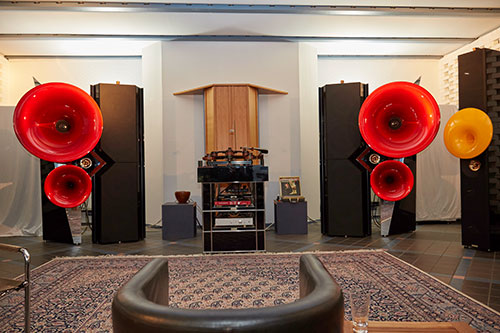For everyone who takes a real interest in High End it's a truism that even the best equipment can't recreate a live impression. This alleged fact, however, while perhaps not refuted, would be at least seriously shaken by visiting the Audio Forum in Duisburg, Germany, the Acapella Audio Arts showroom..
As usual, my comments don't start with a description of the sound; you‘ll have to wait a bit for that. Instead, we'll start with the Audio Forum and both its founders: Hermann Winters and Alfred Rudolph, who got to know each other in 1972, naturally via the topic Hi-fi and music. Hermann Winters had already been running the company Hifi-Elektroakustik since his time at school, and Alfred Rudolph his company ARAkustik. They opened their shared hi-fi studio, Audio Forum, on 4th September 1976. Their trading licence has an even earlier date, but both of them see the foundation date of the company as the opening of the studio in the Koloniestraße 203 in Duisburg. The first room which you enter coming in off the street was really small, and not really ideal acoustically. In the shelves on the left of the door were, back then, a manageable number of carefully chosen components from all price categories. Opposite those, Alfred Rudolph's creations were playing, ranging from the compact, still relatively affordable ATR monitor, to the dream loudspeakers with the spherical mid-high-horn and the exceptional Ion tweeter. Also some external brands were available here to compare them with. Single-speaker demonstration was, for reasons of space, not an issue here.

By the way my portrayal isn't based on plastic descriptions of the company founders or on 40 year old photos: I'm writing from my own experience. When I wasn't even dreaming about a professional career with hi-fi, but was studying German, Latin, and education at the Ruhr University in Bochum, I regularly commuted to the Audio Forum, which I didn't discover directly after its opening, but only in 1978 or 1979. The reason for my first trip to Duisburg was rightly and justifiably for an audiophile classic: Esther Ofarims solo album Esther as "ATR master cut recording." Hermann Winters can remember driving to the Cologne EMI studio with an estate car full of the best hi-fi equipment to check the recording. But the equipment there was so good that he could confidently leave his equipment in the car. Regarding the legendary re-issue he commented laconically, "With the first Esther I overdid it a little bit. We edited it with a peak level of plus seven decibels." From this slight exaggeration one of the biggest marketing coups in high-end history came about, the sentence on the cover stating "That ATR MASTERCUT RECORDINGS can be played back without distortion can be demonstrated in the ATR reference studio by appointment."

Naturally my Thorens TD160 with an Audio Technica AT20SLA couldn't cope with the large groove modulations, and I was soon back in the ATR reference studio, alias Audio Forum, again. It began quite harmlessly with the assembly of a Mayware Formula IV on the aforementioned Thorens. But then I was sucked in to the sophisticated Audio Forum concept: Alfred Rudolph and Hermann Winters had a clear vision of what a high-quality chain should sound like, and for the customers who shared this sound ideal, a way to help prepare them for the multi-level journey to the summit. You began with a good integrated amplifier, and then once you had recovered from this investment, to hand it over without too much financial loss, and then in an ideal world to be able to purchase a preamp/full-amp combination which had previously been handed in as part-exchange. With turntables and loudspeakers it was the same: Without making big financial losses you could get closer to your dream hi-fi over the years in small steps – naturally only as long as you were in the Audio Forum cosmos. You got excellent advice and even support if you couldn't spend huge amounts of money.































 |
|




























































































